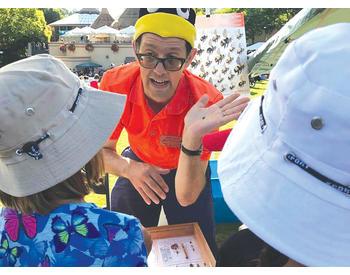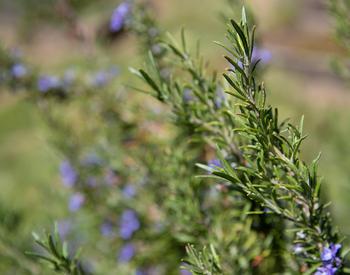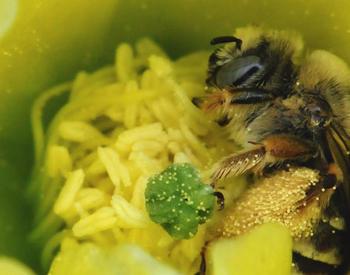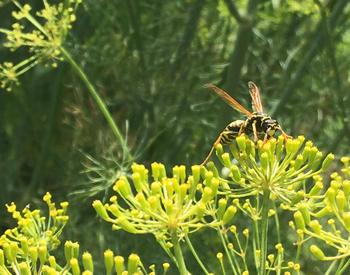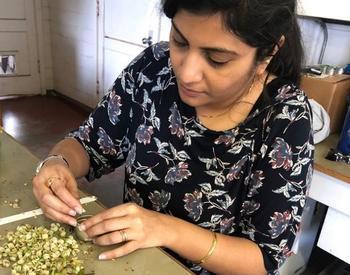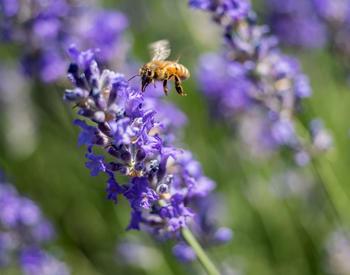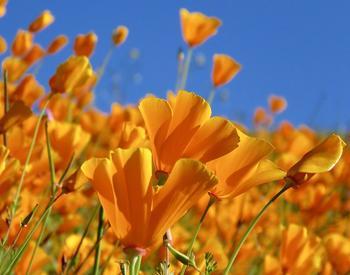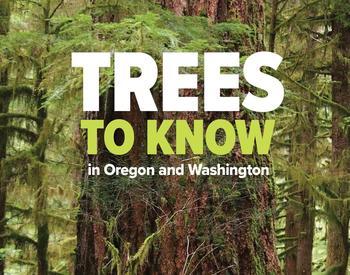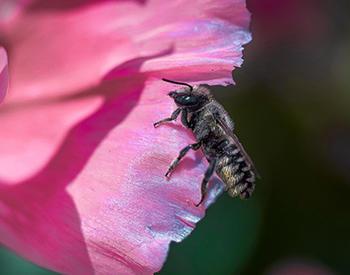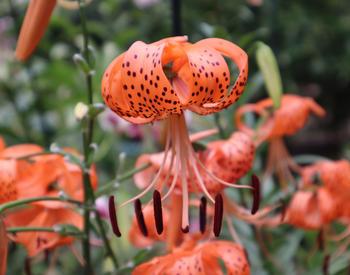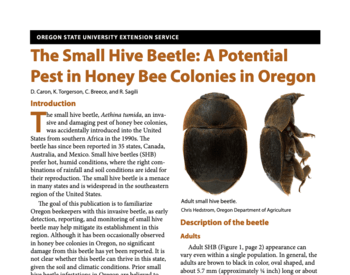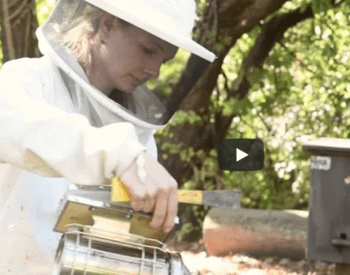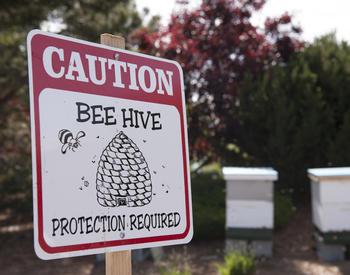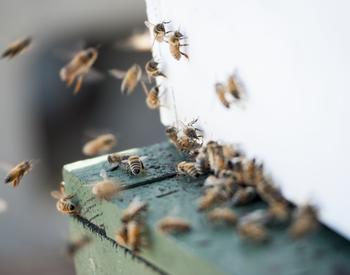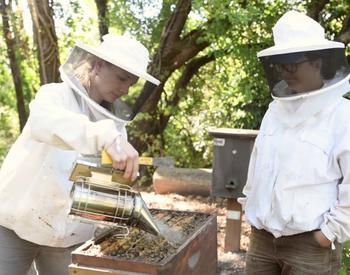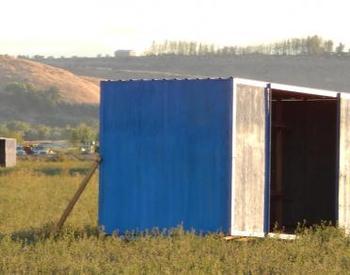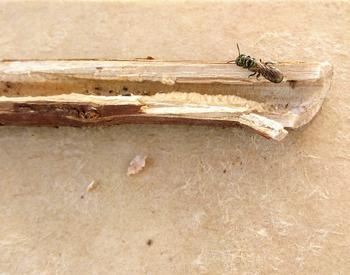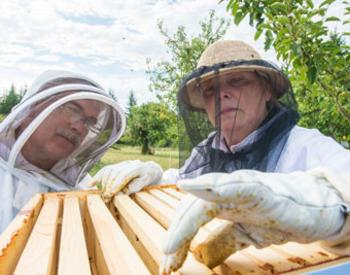Transcript
Andony Melathopoulos: [00:00:00] As frequent listeners of pollination? No. I've often lamented at the absence of organizations akin to the B clubs, where anybody who's enthusiastic about native bees or wild bees can go to both, learn about them, have educational resources, but also be able to put their efforts. Outwards towards either discovering new bees or educating the public on the wonderful bees that we have here in the United States.
I am excited this week to host what is a very amazing initiative. Just north of us in Washington State created in 2020. The Washington Native B Society was created with the aim, and this is from their website of providing a common location for all of Washington solitary, be enthusiasts to convene in a semi-social kind of way.
I'm really. Excited this week to host the president of the Washington Native B Society, David Jennings. Also Colleen Wilson, who's the Vice President and [00:01:00] Education and Outreach Chair. In this episode, you're gonna learn about why this Native B Society was formed. Some of the challenges it is faced in starting up and where the Native B Society in Washington.
Is headed. It's some great tips in this episode if you are in a state that doesn't have a Native B Society on how to get up and running. So without further ado, let's head up to Washington and learn more about forming a native B Society this week on pollination. Welcome to Pollination, David. And Colleen.
Thank you. Thank
Colleen Willson: you for having us. . Welcome to
Andony Melathopoulos: be here. I am so excited to have you here. I, for a long time have been l watching with envy of what's going on in Washington. In that Washington has now formed a native B society. And I wanna just begin by asking you both the question of what prompted you to form a native B society?
Colleen Willson: And the. Pollination podcast was one of the, or [00:02:00] part of our origin story, . I had been working with two separate native B focused organizations and doing research, trying to find one centralized, one authoritative place where I could go for resources and connections and couldn't find it. I couldn't find one specific to Washington State.
I wanted something similar to the Oregon B project. And in July, 2020, you had a podcast with Sarah Johnson from the Native B Society of British Columbia. Ah, that's it, That's what I'm looking for. That's the ticket. And so I contacted her and it went from there. But that's what prompted me.
Andony Melathopoulos: That's wonderful.
David Jennings: Then you reached out, I was gonna say, and then you reached out to. Lisa and Joe and made it
Colleen Willson: happen? Yeah. I reached out to Sarah and she took connected me with Lincoln, who connected me with Lisa and Joe, and then Lisa got David on board. So it's been a snowball
Andony Melathopoulos: effect. And so with in your case, Colleen, you were looking for resources to [00:03:00] is scattered around in various places and you wanted something where everything could be housed. David, how about yourself? What was your kind of, what was your attraction to forming a society rather than just doing the work as you, You all had been doing independently quite brilliantly for some time.
So for the
David Jennings: last several years I've been working with Lisa Robinson and Don Raws. And Don is preeminent community scientist on native bees in Washington. He's been working with folks in Logan for about 10 years, and he had me under his wing. I was working on bumblebees at first, and then Lisa commented to me that she and Colleen and Joe were pulling something together.
I'm like, That sounds wonderful. We need it. And I jumped
Andony Melathopoulos: on. Okay. All right. Fantastic. And it was, I guess that's, one of the things that I learned here in Oregon with the Oregon B project was there were already wonderful initiatives going on. There was already out in eastern Oregon, Eastern Washington, you had, an extensive collection of native bees and skills that were [00:04:00] developing out there.
And on the west side as well, outreach and e education that I always, I remember coming up to a meeting. At the Seattle, at the zoo in Seattle and just seeing all the various initiatives that were going on already. And I was envious, .
Colleen Willson: And that's what I found. I found a lot of really great groups, but no connector.
And that's what I hope to be. The connection or, where people could share resources. .
Andony Melathopoulos: Tell us a little bit about that connecting vision. What is the, what is the mission of the society and what kind of connecting act, what kind of activities would you do to are you planning to do or have done to bind everything together into something?
Colleen Willson: The goal, Okay, so what was Washington Native B Society is, or I hope to be, is an opportunity for Native b Enthusi. To meet each other, to connect with each other and gather information and share resources in an effort to support native bees in Washington state. And hopefully through outreach and education, we'll also be able to create new, be enthusiasts in Washington.
I think currently we, our first year was [00:05:00] a building year, just setting the form, a foundation of everything. This year we've had the opportunity to do meetings monthly meetings where via Zoom. And so anyone in Washington State or beyond can join us on the Zoom meetings, and that's part of the, getting information and meeting each other.
And over the next year, I think we hope to do more outreach and education.
David Jennings: So I, I would echo that and say outreach and education and advocacy for native bees is an important part of our mission. And the other is, Native bees and their identification is not an easy subject to get your hands around.
So we are looking to as part, and I'll give Colleen in a lot of credit for this. At the beginning of the meetings we have people send us photos of bees they've seen and we talk about how you would identify them, at least to Gina. And that really led to be a very participatory interaction with other people around the state who are taking really good pictures and posting.
Andony Melathopoulos: Let me get this straight. So you start these Zoom meetings with people. It's like a [00:06:00] show and tell, and then people, feel, I, I imagine the feeling is that, oh, I'm in a community where I can be supported, like if I have questions. That must be a really great kind of building exercise at the.
Also just Oh, I finally get to know what this B is .
Colleen Willson: I hope it is. I hope that's the intention. So I hope that's how people feel. I know I get a lot of pictures every month and p I put 'em into a pretty basic slideshow, but then we get, when I get to someone's images, they get to talk about where they were.
What kind of flowers they were seeing, what kind of B activity they were seeing. And then they might get some input from the group about maybe what type of B it is or other in
David Jennings: information. And what is really nice is on our board. We have folks that are very well educated in native B taxonomy like Will Peterman and Lisa Robinsons, who can look at the bees and very quickly get 'em to genius and really discuss the whys of what they're looking at.
So that, that's a wonderful resource that [00:07:00] we bring to other people who attend the meetings.
Andony Melathopoulos: I just wanted to maybe ask a little bit about why, I was thinking the difference. In between Oregon and Washington is, we have a state led, initiative with, volunteers that are couched below it, but they don't have an independent society.
And I've been thinking about this, watching the example in both Washington and in British Columbia of forming a society. This is its in own entity. Tell me a little bit about that dimension of it. How did you envision maybe having that as being a critical piece of binding people together?
I'm very fascinated. I don't know if you've thought about that question, but I'm very fascinated by this because of course, as I've mentioned previously, In the beekeeping world, you have independent be clubs. You have places where people could just come in, feel comfortable. It's run by volunteers.
It's like a its own, but tell me a little bit about the society specifically, like the [00:08:00] idea of the society and how you've thought about, and I know I didn't send you this question in advance, but I'm very curious about it.
Colleen Willson: I agree. I think we're still working through that. And I think that right now we've got a core group of people that's in the board and we've got other people, but I would like to find a way in the next year or two if we can call it post covid maybe, but anyhow, where we can actually meet and interact with individuals and smaller groups and maybe within more local organ areas, But, Still in the thought process.
David Jennings: We, we are looking at setting up microscope sessions where people will be able to find a space, bring in microscopes and spend a day or two, like a subset of year B taxonomy classes where people could bring bees. We talk about how to use the key to get 'em where they are, just to start building that base of knowledge.
Like you said, we don't really have something like that yet in Washington, although we. Starting our own native B atlas here is another topic, but we'd like to make [00:09:00] native BS more accessible to more people.
Andony Melathopoulos: I love that. That is wonderful. And I guess maybe that's a great segue to ask, with an atlas, having a society connected to an Atlas project of, as you put it, David people who, may.
Be trained as professional entomologists making really substantial contributions. Tell us where you think was, tell us a little bit about the landscape of Washington and where you expect there to be some, real nuggets of bebo diversity. What are some of the areas that you, you as a society are excited in learning more about?
David Jennings: I think we are doing working with Department of Ag pull together. A checklist of all the known species that occur in Washington based on past collections. And they're about to get that finalized. And one of the first things they'll be doing with it is analyzing it, both from a, what species should be here that we haven't detected, and also what parts of the state have we not sampled yet very heavily.
So that really helped guide us fill in some of [00:10:00] the gaps either geographically or species Mars. And I lost track of where I was. What was the question again? ? No, that,
Andony Melathopoulos: that sets up, that kind of sets up where, where maybe species that you might expect to find or, you may wanna track down. But yeah. But tell us a little bit about the state. For listeners and, I always think the thing that Washington has that we don't have is the North Cascades. .
David Jennings: And that's a great point. So when I was doing my Bumble the analysis work I downloaded from the epa their eco regions level format, uhhuh.
And it turns out, and an eco region is a distinct area based on geology and biology and hydrology and a lot of different factors to say this is distinct from other eco regions. At the Eco Region four level that EPAs defined. We have 54 different eco regions in the state, which is pretty darn high.
And if you think about it, we've got the coast range, we've got very high alpine mountains. We have the dry side, [00:11:00] east side of the cascade, We've got the save step truck step. We've got, and then as you get further east, the rain picks up and we have, the Blue Mountains and the cell curtains.
So we just have a great deal of variety. And you look at some of the places on the east side, particularly like the Okanagan and some of the large tracks of federal land, and we expect to find quite a bit of diversity in the higher elevations and in some of the undisturbed lower elevations all over the state.
Andony Melathopoulos: Fantastic. I guess this also, raises the question. I know in some states Washington included insects are categorized by the state as wildlife, and I suppose that opens up some challenges in terms of being able to survey. Can you tell us a little bit about that dimension?
David Jennings: Let me, I'm gonna backtrack a little bit and say, I just wanna give a lot of credit to Lincoln Best your B taxonomist and one of our earliest meetings of the B Society while we were just getting organized. I think it was our second meeting, he popped in and he said, Look, you [00:12:00] guys the legislature is interested in pollinated us right now.
They set up a task force run by the partner of ag. We can get pollinator health questions if you don't get in there. Advocate for a b at list, you're gonna miss your opportunity of getting the legislator's attention. So at first I'm like, we've only been like organized for a month. That's just a little premature
Exactly. But I thought about it and I do have a little bit of background in, in Conservation biology and conservation politics and recognized that it was actually absolutely right on target that if we didn't seize the iron while it was hot, we were gonna really miss an opportunity for years.
So I spoke to other members on, in the B Society and took the lead to work with the pollinator health task force, and they actually really enthusiastically embraced the concept of setting up a, the at. Similar to the Oregon B project, and so they went to the legislature and the legislature was supported enough.
They actually set up a permanent position for a [00:13:00] BT Taxonomist for Washington to support the B Atla efforts. Which I
Andony Melathopoulos: know there's an advertisement out now, so if you are a BT Taxonomist who's looking for a fascinating challenge, . Yes. We'll put the app, we'll put the application in the show notes. I
David Jennings: think, I don't know when this is gonna get published.
I know that they'll be doing their, we know that there's a lot of interest in the position and people that have, are waiting for the announcement to come out. I think that they're only gonna keep it up out for three or four weeks before they start doing the first set of, Do we have anybody we wanna interview?
Jump on the con on the opportunity if you can. We'd love to get.
Andony Melathopoulos: Oh, and just the the other challenge of being in a state, and I imagine other states like California are in this situation where insects are considered wildlife, and that does in Oregon, Idaho as well, this is not the case.
We have to obtain permits to get permission to collect, but we don't have the same there's a additional layer of permitting in states like Washington. [00:14:00]
David Jennings: Yeah. So once we started looking at developing a b at list, I went to the department. So I'm a in, in a previous life I was a state fish and wildlife commissioner and have a lot of loyalty to the department of Fish and Wildlife and went to them and said, Look, as we start surveying for all these bees we expect to find county records and state records, and I would love to have them found on wildlife lands, Wildlife manion.
Because that really points out to everybody the value that our wildlife management areas provide to the state as far as biodiversity and native pollinator habitat. And I was a little surprised when they said for you to actually catch anything in a net, you'd have to get a state collecting permit.
Because of the state, insects are considered wildlife and you can't collect wildlife without a permit or a license. So we had a conversation around that. I think everybody recognizes that's, As the legislators wrote the authorizing environment language, [00:15:00] what we call an rcw, they really were thinking of wildlife, and this is my opinion, they were thinking of wildlife as verte bricks and endangered species.
And so they said you can't do anything about them. When I reached out to our legislators last session they were very much open to modifying the language to recognize. It, it's strange that you can kill a b with pesticides because you're scared of it. But if you stick a pin in it and look it under a microscope, you're breaking the law.
So they, they recognize that sort of a challenge to that, that doesn't make a lot of sense. And we'll be working with them. This led to legislative session to look at how we modify the existing revised code of Washington. To allow and I'm hoping it's gonna be terrestrial invertebrate, specialist bees to be captured as long as they're not a state or fairly listed or species of concern species.
And I'll optimistic that's gonna be the case. I think when California tried to say you can't catch any insects. They got a pretty big [00:16:00] pushback. And it really does hurt science as a whole and it hurts people's ability to connect with nature. So there's a lot of positive reason for letting people collect insects.
That's an entryway into the biological sciences when you're a kid, for example. So I'm optimistic that we'll be changing the current approach to bees and the permitting and allow us to do it without a permit as an individual. The whole bees in your backyard. Book is just a great tool as we work with our legislators to say we're not even allowed to look in our in our backyard for the bees
So I'm optimistic.
Andony Melathopoulos: And I imagine from a conservation perspective, if you don't have detailed range maps and you don't have a species inventory and you don't know where species are, it makes conservation decisions very difficult because you're really functioning with a data deficient kind of picture of the world.
David Jennings: And I start off with a conservations perspective. And one of my mantras that I got from the Reef Environmental Education Foundation was a phrase learn them, respect them, protect them. [00:17:00] And what we find is people don't think about as species. They don't think about a species and they don't care.
But if you get it on their radar screen, they have a lot of empathy for other species. But by not allowing people to interact with you don't really have that. So we look at getting people interested, native bees as a very important conservation initiative so that people appreciate the value of our local pollinators.
Andony Melathopoulos: Colleen, I think that's wonderful. I love, and I guess that really purposes the society. This is really digging its roots deep into, everyday life and people who are doing things. And when you look forward to I have joined I've been invited to the social media page where.
Really wonderfully. Some great pictures, some great little snippets in education about the native bees of the state. But when you look forward to the next few years, what is, the society's vision for outreach and education, what would you your biggest hopes?
Colleen Willson: Oh, biggest hopes. I wish hand [00:18:00] thought this through completely.
But I would love to see, outreach throughout the state over, during. Summer months, the, b season where we can help people, like David said, if people don't interact with the animal or bee or whatever, they not, they're not gonna care. And when I have participated in outreach, very often people love to talk about bees.
They come up and they see bees and they're like, they just wanna talk about them. But most of the conversations are like, that time I got stung, or when all these bees came out of the ground. And I'm like, But those weren't bees . And a lot of times it wasn't actually a b they're thinking of wasps.
So just the basics. Letting people understand that there's such a huge variety of native bees and it's not just honey bees and it's not the wasp that stung you last year or whatever. That they're very different. And I just, and so what's the biggest goal? I just I want to continue to [00:19:00] grow.
I would love to see this group operate to such a degree where the, it's big enough where we have to have small, local chapters. But currently I just would love to get more people involved, especially people from the east side cuz we don't have as many and we don't have as many people from that side of the state.
And we do have ways for people to get involved.
Andony Melathopoulos: Yeah, tell us about that. How, So you're a listener in Washington, you've. Working away on native bees and you didn't even know there was, You're like, I have to get ahold of these people. I want to get, How do you get involved? Or let's say you're just a listener in Washington.
It's. I really support them. I really would love to, contribute to them or help them out, but what are my options? Lay that out for us.
Colleen Willson: Then we have a number of ways. So first of all, we have our monthly meetings. It's a fourth Thursday of every month. And at the beginning of each meeting we have a be share or show and tell essentially where anyone can send me pictures of bees, and I will put those up on a slideshow.
And then at seven [00:20:00] 30 we have a speaker. Various topics. We've had some great speakers over the last six months or more, and we continue, we'll continue to do that. Also if you just are taking pictures and you have a picture of a be and you put it in iNaturalist iNaturalist, we have a the Washington Native Bee Society has an unnatural collection group.
And all of those B pictures will go in there and Lisa and Will and Tina are very active and will interact with you about those pictures and tell you what, what they think it is. Or maybe they just wanna ask you questions. So
Andony Melathopoulos: I natural. So if you are in your backyard, you see a crazy bee and you're like, you take, you get, you upload this iNaturalist app, which is really easy to use.
You take, you just take a picture and then. Make its way into this project, and then yeah they'll help you out from there. Just automatically. You'll get a little note, I guess with your contribution. .
Colleen Willson: Hopefully. Yeah. , I can't say that they'll see every single bee that's posted in Washington state, but they do try.
Okay. Then we also have a Facebook [00:21:00] group. Again, Washington Native B Society that where people can share and communicate. We have a website and that's wa native b society.org and we're continuing to build that up on there. You have an opportunity to join as a member and Oh, David, off the top of my head, I can't remember how much it costs to be a member, but you don't have to be a member to go to our meetings though.
But if you but you can join as a meeting a member and you'll get the email invites and email notifications about our activities. And I think there's an Instagram group too, so we got that
David Jennings: covered.
Andony Melathopoulos: And I guess to join,
David Jennings: Oh yeah, go ahead. I was gonna back up a little bit and say one of the, one of the best outreach tools that we're about to have, our, we have a very talented and diverse board.
Joe Del Lugo is our webmaster and he's also been, he's an excellent native B photographer and has been putting together a poster of native bees of Washington, similar to the poster you get when you [00:22:00] get, if you get the birds in your backyard. A poster except it's all Washington safe specific bees.
And so we really see that as an outreach tool that's gonna be very effective. We've already had retailers ask us if they can get copies so they can sell them for us because it's so attractive. So I think just exposing people to the diversity of what Native bees look like isn't gonna be very helpful for our advocacy purpose.
Andony Melathopoulos: Okay. I got two questions. So the first one is, let's say you, you're listening to this podcast and you wanna join the Zoom meeting. How do you, how does that happen? You just send an email and you
Colleen Willson: Yeah. If you go to the website, the. Wa native b society.org. If you go to the website there is a place to register for the meeting, and then you'll get the email invite for the Zoom meeting.
Andony Melathopoulos: And let's say I'm a nonprofit in Washington and I'm listening to this and I want to get some of these cards. How does that work?
Colleen Willson: The, are you saying the posters that Joe made? The posters Yes. Yes, [00:23:00] we will let you know because they, he is currently just at the printers right now. I think that's like his job today.
He's going to the printers and getting it taken care of. So once that is up, we will, we are gonna figure out how to get 'em to everyone else who wants them. And that might be through our website
Andony Melathopoulos: as. Okay we will, I'm gonna, we will have the website in the show notes and I really encourage anybody in Washington who's interested in Native BS to reach out, attend the Zoom meeting, and become a member of the Washington Native B Society.
This is such an exciting initiative and it's been, every time I just turn my shoulder you guys are doing something new and wonderful. It's just amazing how vibrant and dynamic your group.
David Jennings: And we don't restrict our membership to only people in Washington. If you live in Delaware, we're happy to have you as a member.
Andony Melathopoulos: My membership is in the mail then. . Sounds great. , thank you so much for joining us today and sharing about the Native B Society. And I really, I think this is [00:24:00] a great call out to, Idaho but also other states to maybe consider this as a great model for as. Put it to bring the various strands together and work together in in native B education outreach and conservation.
Thank you so much for joining us. Oh,
Colleen Willson: thank you for having
Andony Melathopoulos: us. Thank you.
That's that.
Colleen Willson: Thank you. I hope I.
If you are interested in native bees and a member of the public where do you go? Washington has a new approach, namely the formation of a native bee society, which enables people across a wide range of interests to get together and work towards the preservation of the bees of the Evergreen State.
David Jennings is the President of the WANBS. He started young as a naturalist. He had the opportunity to study for two summers on the Smithsonian Institute’s Barro Colorado Island in Panama, where he worked as a field apprentice during high school summer breaks, mist netting birds and researching sloths, howler monkeys, bats and silky anteaters. David has a BSFR in Forestry and Wildlife and a master’s in Biostatistics. His passion is wildlife conservation. While in college he was privileged to study under, and garden for, Dr. Eugene Odum, father of modern Ecology. He has helped protect native forests in Georgia, Arkansas, and Oklahoma before moving to Washington state in 1990. Once here he helped found the 501(c)3 Gifford Pinchot Task Force to protect our remaining ancient forests in SW Washington. He served as their Board Chair for ~15 years. David is an avid scuba diver here in our NW waters. In 2012 he was honored with the Volunteer of the Year award from REEF for his advocacy for the beleaguered rockfish in Puget Sound. His passion for conservation resulted in Governor Gregoire appointing him to the state Fish and Wildlife Commission where he served from 2009 to 2013, helping pass the State Wolf Management plan. David focused on bumble bees and other native pollinators as a needed return to field work after serving on the commission. He has been somewhat obsessed with bumbles ever since…
Colleen Willson is the Vice-President and Education/Outreach chair of the WANBS. Prior to this, she worked with two separate native bee related organizations: CCUWBee (Cascadia College/UW Bothell Bee research initiative) studying the abundance and diversity of bees on campus and BeeVesting (now Pollinator Pathway NW out of 21 Acres in Woodinville) supporting local agriculture by promoting pollinator health. While doing research for those organizations, she found a number of small groups and individuals who were doing work with local pollinators but she found herself searching for a larger organization that she could turn to for all Washington-based native bee resources and connections similar to the Oregon Bee Project. It wasn't until she heard the PolliNation podcast episode with the founder of the Native Bee Society of British Columbia that she recognized what I was looking for and began the work of developing WANBS. She wanted to create an organization that could support native bee enthusiasts of all levels and interests and to encourage them to connect with each other in an effort to support the native bees in WA.
Links Mentioned:
